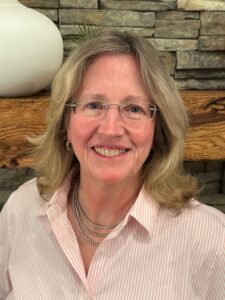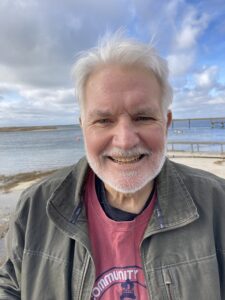TRURO — At a well-attended candidates forum on May 7, the four people running for two seats on the select board in the May 29 town election stated the priorities that would shape their approaches to the job. As the four candidates — all of whom already serve on at least one town board or committee — responded to questions from the audience, they laid out their different visions on affordable housing, taxes, and the demographic makeup of the town.
Select board chair Kristen Reed and clerk John Dundas, the two incumbents whose terms are coming to an end, are not seeking reelection.
Susan Girard-Irwin, who is vice chair of the council on aging board, advocated for greater intergenerational interaction and a balance between housing and water concerns. Kevin Grunwald, chair of the town’s housing authority and an employee at Truro Vineyards, pushed for moving forward on housing and increasing the town’s year-round sustainability. Tim Hickey, the concert committee vice chair, wants lower taxes. And Nancy Medoff, chair of the charter review committee, advocated for creation of a “master plan” for a more sustainable Truro.
On Taxes and Housing
In response to a question about reducing the tax burden in town, the candidates had differing views.
“I hear about runaway spending,” said Grunwald, “but when I look at the budget that was presented” at town meeting, “I don’t see it as being especially fat; I see it as being responsive.”

Hickey, on the other hand, said reducing taxes is “near and dear to my heart.” He called for budget “transparency” and said, “We have to learn how to live within our means and possibly reduce the growth rate.”
Jo Citron asked how the candidates would approach land acquisition and housing development given that Truro “wants to remain rural” but is also “in dire need of housing.”
Hickey responded that, at the recent town meeting, “we secured, I believe, 252 units to come down the pipeline.”
Although the number of housing units to be built on the 70-acre Walsh property can’t actually be determined until developers make proposals that weave together housing needs and financing opportunities, the recommendations that passed at town meeting in fact called for a maximum of 160 units. (The Walsh Property Community Planning Committee had reduced its initial proposal from 252 units to 160 last September.)
“That’s close to the 10 percent that we need to meet the obligation of the state,” Hickey added.
Falling short of the state’s benchmark of 10 percent of the town’s housing stock being affordable — while not an obligation — allows developers to seek comprehensive permits from the town’s zoning board of appeals and thus expedite the approval of their projects.
Medoff said that Citron’s question “speaks to my strong desire for a master plan.” When it comes to land, Medoff said, the plan would include information like “What is available? Where is it? How much is it? How will it impact our housing needs?”

Girard-Irwin referred to the Walsh planning committee’s 160-unit recommendation and said that the recently approved Walsh advisory committee should be convened right away. “We get stuck on 10 percent” as a standard, she said. “If you look at the housing needs in Truro, it’s really well beyond the 10 percent.” She advocated for having several housing efforts in process simultaneously.
Grunwald agreed. “If we had 252 units coming down the pike, I would be up here celebrating right now,” he said. “I’m not sure where those 252 units are going to come from. For affordable housing development, it’s important to have projects that are at different stages because it takes so long” to build.
Diversity and Trust
Joe Anarella asked the candidates to speak about increasing diversity on municipal boards and committees.
“I think we need a recruitment strategy for a diverse group of committee and board leads,” said Medoff, who has worked as a leadership coach. She said that more leadership training for appointed committee members would be helpful.
Most of the questions were addressed to all candidates. But Hickey fielded two related to his responses on a questionnaire posted online by AFA Action as part of a voter guide designed to “mobilize more faith-based voters” when he was running for Washington state representative in 2020. [Editor’s note: the answers to the AFA Action questionnaire have been removed from the organization’s website.]
Raphael Richter pointed to the fact that, on the questionnaire, Hickey had “strongly agreed” with the statement: “Governments should define marriage as between one man and one woman.”
“How can the voters of Truro trust you when you have shared views about these values that are so opposite those of so many residents?” Richter asked.
Hickey said he didn’t remember taking that stance. “I might point out to you that I have a son who I single-parented and he’s gay,” he said. “I have my viewpoints about certain things, other people have others, but my son is the most dear person to me in my life.”
Hickey added that he’d rather discuss Truro “instead of personal opinions.”
“I know this is not a debate, but it’s not a personal choice or personal preference — someone’s sexual orientation or right to marry,” said Girard-Irwin, who is gay and married. “It does have relevance in this town. That’s why I moved here.”
Orin Dunigan asked Hickey about his stance on undocumented immigrants. On the same questionnaire, Hickey had said he “strongly agreed” with the need to build a border wall.
Hickey responded that in Seattle he had employed undocumented workers at his construction business. “This is an issue I think that’s more for the states that are suffering from undocumented people, migrants, and it’s not as big an issue with Truro right now,” he said.
Morgan Clark asked Girard-Irwin about her remarks at town meeting regarding a proposed $30,000 senior needs assessment, which was struck from the town’s budget. Girard-Irwin had commented on the lack of involvement of the council on aging on that budget item. “I had some real concerns,” Clark said, “when you spoke up against the department that you support.”
Girard-Irwin replied that she had voted in favor of the proposal. “My points were not against the senior needs assessment or the cost of it,” she said. What she had intended, she said, was to point out a “disconnect” among town officials.
Envisioning the Future
Erin Golden addressed her question to all four candidates: “If you weren’t running, or you don’t win, what two people here would you like to see on the select board and why?”

Three of the four candidates evaded the question, but Grunwald said, “I’m going to take the ball and run with it. My selection would be Sue or Nancy if I were not elected.”
Kristen Reed, who will step down from the select board following this month’s election, asked the candidates about their priorities among the current board’s goals and objectives.
Grunwald and Medoff both responded that water, wastewater, and coastal erosion are urgent matters facing the town.
Everything on the list is a priority, Grunwald said. He added that environmental concerns like water and erosion are inextricable from housing.
Medoff suggested streamlining the select board’s goals. Water and coastal erosion “jump out at me as a bucket that can be addressed with a master plan,” she said.
“I believe there are 68,” said Hickey of the select board’s 19 goals and objectives. He said those priorities “should be reviewed immediately” and “checked for how we can get them done without charging more tax money.”
Select board member Stephanie Rein asked the candidates to speak about their visions for the future of the town.
Grunwald advocated for “diversity that we talk about extensively but we don’t always act on.” He said he recently ran into a friend with a baby at the grocery store: “I realized I hadn’t seen a baby in a long, long time.”
Girard-Irwin said she wants to see enrollment go up at Truro Central School. “I did not move here to be in a senior community,” she said.

Hickey said he’d like to see more volunteering, inspired by the select board.
Medoff spoke in favor of a less seasonal town. “I believe that together we can make Truro a thriving year-round community where all of us can call Truro home,” she said.
The select board race is Truro’s only contested election on the May 29 ballot. All other boards and committees with vacancies have incumbents running unopposed.



